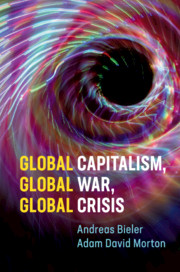Book contents
- Global Capitalism, Global War, Global Crisis
- Global Capitalism, Global War, Global Crisis
- Copyright page
- Dedication
- Contents
- Tables
- Figures
- Acknowledgements
- Abbreviations
- Introduction
- Part I Conceptual Reflections
- Part II Thematic Considerations
- Part III Empirical Interventions
- Conclusion
- Bibliography
- Index
3 - The Material Structure of Ideology
from Part I - Conceptual Reflections
Published online by Cambridge University Press: 30 April 2018
- Global Capitalism, Global War, Global Crisis
- Global Capitalism, Global War, Global Crisis
- Copyright page
- Dedication
- Contents
- Tables
- Figures
- Acknowledgements
- Abbreviations
- Introduction
- Part I Conceptual Reflections
- Part II Thematic Considerations
- Part III Empirical Interventions
- Conclusion
- Bibliography
- Index
Summary
The argument of this chapter is that an approach drawing from sources within historical materialism is most adept in appreciating the internal relations, expressed within the notion of the material structure of ideology, between the ideational and material realms as mediators of configurations of class forces. This approach is intrinsic to the argument of this book in its attempts to assess the conditions of Global Capitalism, Global War, Global Crisis thematically in Part II and empirically focused in Part III.
Similar to the relation between structure and agency discussed in Chapter 2, the conceptualisation of the role of ideas within international relations (ir) and international political economy (ipe) has become increasingly important over recent years. Neorealism and liberal institutionalism generally treat ideas as exogenous to states’ interest formation and interaction. It has been pointed out, however, that such approaches cannot answer important ‘questions of which economic theories and beliefs are most likely to shape the definition of interests in international relations and why and how it is that particular sets of ideas prevail in the international arena’ (Woods, 1995: 161; see also Jacobsen, 2003: 41). A first set of attempts to deal with this problem resulted in an amendment to these approaches by simply adding an additional focus on ideas (e.g. Adler and Haas, 1992; Goldstein and Keohane, 1993; Haas, 1992). For example, some scholars have tried to identify institutional and/or actorcentred causal mechanisms. Ideas acquire causal relevance, it is argued, when they become embedded as organisational rules and procedures in institutions (Goldstein and Keohane, 1993: 20–4; Yee, 1996: 88–92). These approaches are based on a positivist understanding of social science, which involves a separation of subject and object and the search for clear cause–effect relationships.
A problem befalling this literature, however, is that while ideas are still treated as causes, as possible additional explanatory variables, this leaves no space for understanding ideas as partly constituting the wider social totality. Ideas are merely seen as commodities, as objects which influence other objects. This ‘reinforces the notion that “ideas” are distinct from interests and that their role, in practice, is limited to manipulation; and it obscures the constitutive function of “ideas”’ (Laffey and Weldes, 1997: 207).
- Type
- Chapter
- Information
- Global Capitalism, Global War, Global Crisis , pp. 51 - 76Publisher: Cambridge University PressPrint publication year: 2018
- 1
- Cited by

